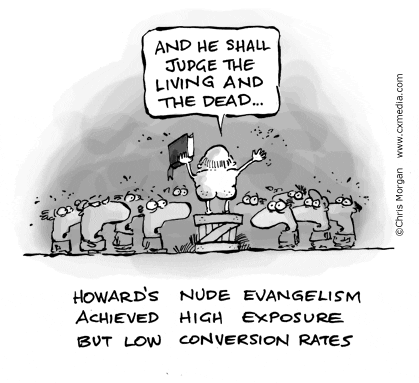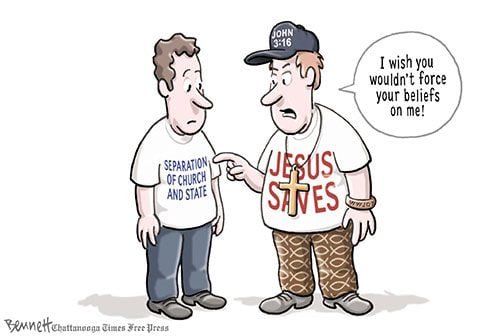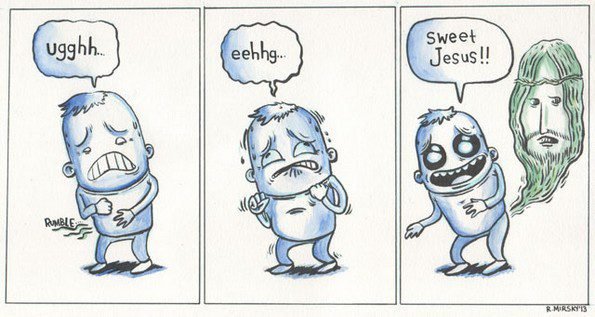
Christmas: it’s that time of year. Joy to the World. Handel’s Messiah. Cookies and fudge. Eggnog. Shopping. Evergreen trees decked with ornaments and lights. Cards. Presents. Ugly sweaters. Family gatherings. Excited grandchildren. Ah, the wonders of the Christmas season.
But there’s one aspect of Christmas hated by non-Christians, and that’s their Evangelical relatives and friends using the holiday as an opportunity to evangelize those they deem lost and headed for Hell.
From tracts stuffed into Christmas cards to Christian-themed gifts, evangelistically-motivated Evangelicals make sure that their non-Christian family members and friends know that Jesus is the Reason for Season and that unless they know The Prince of Peace, They will Have No Peace.
Even worse are those Evangelicals who make a concerted effort to talk to unsaved relatives about their spiritual condition at family Christmas gatherings. Told by their pastors to use the Christmas season, with its focus on joy and family, as an opportunity to witness to the lost, Evangelicals make concerted efforts to put in a good word for Jesus whenever they have an opportunity to do so.
We’ve all been there. We’re hanging out with our family at the annual Christmas gathering: eating Mom’s food, swapping childhood stories, drinking wine, laughing, and enjoying life. And out of the corner of our eye, we see Evangelical Uncle Bob coming towards us. Oh shit, we say to ourselves, not THIS again. “This” being Uncle Bob snuggling up to you so he can tell you for seemingly the hundredth time that Christmas is all about Jesus, and that the greatest gift in the world is the salvation that God offers to every sinner. Sinner, of course, being you. And as in every other year, you will politely listen, smile, and think in your mind, just one time I’d like to tell Uncle Bob to take his religion and shove it up his ass. Your thoughts will remain unspoken, and after your evangelizing relative is finished extolling the wonders of Jesus and his blood, you say to him, just as you do every other year, Hey, Uncle Bob, how ’bout them Cowboys? You know that there is one thing that Uncle Bob loves to talk about almost as much as his savior Jesus, and that’s America’s team, the Dallas Cowboys.
Several years ago, Fundamentalist Calvinist pastor John Piper reminded his fellow cultists of the importance of giving non-Christian relatives prayed-over, Bible-saturated books during the Christmas season. Piper wrote:
The Christmas season is ripe for “reviving your concern” (Philippians 4:10) for the spiritual wellbeing of friends and family members. We may lament the expectations of gift-giving and the excesses of holiday spending, but we can take it as an opportunity to invest in eternity by putting God-centered, gospel-rich content into the hands of those we love.
Next to the Bible, perhaps the most enduringly valuable gifts you can give this Christmas are books soaked in God and his grace. Online articles, sermons, and podcast episodes change lives and sustain souls, but they don’t make for typical material Christmas gifts. Printed books, on the other hand, wrap well, and can be just as life-changing and soul-saving, and more.
As Christmas approaches, we wanted to remind you of our recent titles from the team at Desiring God. We’ve done our best to saturate them in the Bible and fill them with God and his gospel, and we’ve prayed over them again that they might be a means of God’s grace not only for you, but also your loved ones…
Randy Newman, Senior Teaching Fellow for Apologetics and Evangelism at the C.S. Lewis Institute, suggests that Evangelicals look for opportunities to share bits of the gospel:
I know this sounds counterintuitive. In fact, to some, this may sound like downright heresy! Some of us have been trained to “make sure to state the whole gospel” or “their blood will be on our hands.” To me, that sounds a bit like a lack of trust in the sovereignty of God. In our day of constant contact (through email, texts, tweets, etc.) we can trust God to string together a partial conversation at Christmas dinner to a follow up discussion the next day, to a phone conversation, to numerous emails, etc. Some of our unsaved family members and friends need to digest parts of the gospel (“How can God be both loving and holy?”) before they can take the next bite (“Jesus’ death resolves the tension of God’s love and his holiness.”)…
Back in the days when I was a fire-breathing Independent Fundamentalist Baptist (IFB) preacher, I encouraged church members to use the Christmas holiday as an opportunity to witness to their unsaved relatives. Hell is hot and death is certain, I told congregants. Dare we ignore their plight? Remember, the Bible says that if we fail to warn our wicked relatives of their wicked ways and they die and go to Hell, their blood will be on our hands. Despite my attempts to guilt church members into evangelizing their relatives, not one member reported successfully doing so. Most of them, I suspect, ignored my preaching and said nothing to their relatives. And those who did likely made half-hearted attempts to interject Jesus into family Christmas discussions. Regardless, not one person was saved as a result of our Christmas witnessing.
Let me conclude this post with a heartfelt, honest appeal from non-Christians to Evangelicals bent on witnessing to family and friends during the Christmas season:
Christmas is all about love, joy, peace, and family. Religion, like politics, is a divisive subject, and talking about it will certainly engender strife and resentment. I know that you think our negative response toward your evangelistic effort is the result of our sinfulness and hatred of God. What you fail to see is that our irritation and anger is the result of your unwillingness to value family more than you do Jesus. Besides, we’ve heard your Jesus shtick before. We get it: we are sinners, Jesus died on the cross for our sins and resurrected from the grave three days later. If we want our sins forgiven, we must repent of our sins and accept Jesus as our Lord and Savior. If we refuse God’s wonderful offer of salvation and eternal life, when we die, we will go to Hell. See? We heard you. There’s no need for you to keep doing your best imitation of a skipping record. If we ask you a question about your religion, then, by all means, answer it. We asked, and we wouldn’t have asked if we didn’t want to know. However, if we don’t ask, please keep your religion to yourself. If you truly love and respect us, please leave us alone.
If you choose to ignore our request, we will assume that you are determined to be an asshole for Jesus. While we will likely walk away from you, we might, depending on our mood, decide to give you a dose of your own medicine by sharing why we think your God and Jesus are fictitious. We might even challenge your so-called Bible beliefs. You see, we know a lot more about Christianity than we are telling. It’s not that we don’t know. We do, and we find the Christian narrative intellectually lacking. While Jesus gives your life meaning, purpose, and peace, we have found these same things in atheism, agnosticism, humanism, paganism, or non-Christian religions. We don’t need what you have because we already have it.
Most of us who are non-Christians will spend the Christmas holiday surrounded by believers. In many instances, we will be the only non-Christian in the room. While we love the Christmas season — with its bright colors, feasts, and family gatherings — contemplating the fact that we will be the only atheist at the family Christmas gathering can be stressful. We understand that Christmas is considered a Christian holiday. When Christian prayers are uttered, we will respectfully bow our heads. When Christmas carols are sung around the hearth, we will likely join in (many of us like singing Christmas songs). We will do our best to blend in.
Please, for one day, when we are all gathered together in expression of our love for one another, leave Jesus and your religion at the door. By all means, if you must talk about Jesus, seek out like-minded Christian family members and talk to them. When talking to us, let’s agree to talk about the things we have in common: family, childhood experiences, and our favorite football team.
Bruce Gerencser, 68, lives in rural Northwest Ohio with his wife of 47 years. He and his wife have six grown children and sixteen grandchildren. Bruce pastored Evangelical churches for twenty-five years in Ohio, Texas, and Michigan. Bruce left the ministry in 2005, and in 2008 he left Christianity. Bruce is now a humanist and an atheist.
Your comments are welcome and appreciated. All first-time comments are moderated. Please read the commenting rules before commenting.
You can email Bruce via the Contact Form.











 Guest Post by ObstacleChick
Guest Post by ObstacleChick